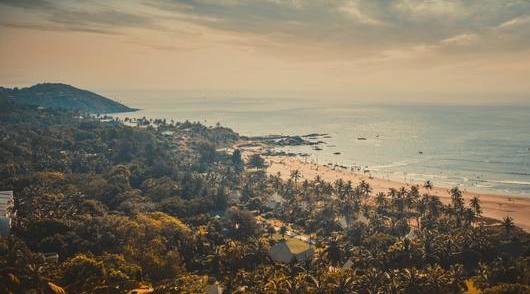PRESS RELEASE
SUPREME COURT OF INDIA ISSUES NOTICE ON WRIT PETITION ON WESTERN GHATS FILED BY GOA FOUNDATION AND 26 OTHERS
A three judge bench of the SC headed by CJI Sharad Bobde today issued notice on a comprehensive writ petition (No.369/2020) filed by a minor, Ms M Kaviya, and 26 others including several environmental activists and NGOs like the Goa Foundation and Peaceful Society, Bandora, from 6 Western Ghats States for re-instating the recommendations of the Western Ghats Ecology Experts Panel (WGEEP) report on the Western Ghats. The panel was headed by Dr Madhav Gadgil.
M Kaviya, who lives in Nilgiris, and 7 other minors have sought justice in terms of intergenerational equity. The petition states that if present developments are permitted unchecked without the controls recommended by the Gadgil Panel, there would be no future left either for them or their generation.
The Goa Foundation and Peaceful Society, Bandora, are among the 23 petitioners, together with Ankur Trust from Maharashtra and River Research Centre, Kerala.
All 6 Western Ghats state governments, the Ministry of Environment & Forests & CC, and 6 State Pollution Control Boards are respondents.
The petitioners have approached the Supreme Court under Article 32 of the Constitution of India for urgent directions and orders that will result in an effective, sustainable and credible conservation regime for the Western Ghats, its diverse ecosystems and ecologically sensitive zones. The petition states that the urgent intervention of the Hon’ble Court is the paramount need of the hour for safeguarding lives and livelihoods of millions of people directly and indirectly dependent on the ancient mountain system inherited by them from earlier generations. The petition concerns a total land area of 1,29,037 sq. km. A population of 50 million people is directly dependent on the Western Ghats and its ecology, and another 200 million people are indirectly dependent. The future of entire southern India is intimately linked with the healthy survival of the Western Ghats. Respondents herein have abjectly failed to do justice to the Petitioners and the Western Ghats, despite being empowered to do so.
The present Petition has been filed after the Petitioners have approached the concerned authorities on numerous occasions and sent several representations. Despite their demands for action and urgent conservation/ preventive measures, no effective action has been taken by the Respondents, and the Western Ghats continue to witness rapid environmental degradation.
The petition refers to the massive environmental disasters that assaulted several parts of Kerala and Karnataka during the 2018 monsoon, and in 2019, which are grave and grim indicators that the concerned authorities, both at the Centre and State level, are not seriously seized of the developments that threaten to undermine this vast ecosystem that stretches across six western coastal states – particularly in an era of climate change.
A total of 483 people died in Kerala during the 2018 monsoon floods. 14.50 lakh people were relocated to relief camps. The loss was estimated to be more than the annual outlay of the State. In Kodagu, Karnataka, 16 people perished, 1206 houses were destroyed, 123 km of road was washed out and 278 government buildings collapsed. A glimpse of the nature and scale of devastation caused by the 2018 monsoon flooding in Kerala and Karnataka (Kodagu district) has been annexed to the petition through photographs. The common people should not have to live under the constant fear that the nightmare they faced when the floods struck, as government authorities stood by helplessly, may revisit them.
Two expert committee reports, were submitted to the Ministry of Environment and Forests, first, by the WGEEP headed by Dr Gadgil, and second, by the Kasturirangan High Level Committee. The Gadgil report however, was ignored for no reasons given. The Kasturirangan Report has been watered down considerably by various State governments, with the active collaboration of the Ministry of Environment, to a level of meaninglessness. Kerala has excluded the entire area recommended by the Kasturirangan Committee by setting up its own committee. Goa and Maharashtra have sought to exclude large number of villages from the protection of being in Ecozones. Karnataka has taken a decision not to accept the Kasturirangan report. The result is that the region, recognized as one of the world’s 8 biodiversity hotspots, does not have the protection that was sought by the MOEF&CC when it set up the WGEEP.
Reliefs sought:
1) To implement the recommendations of the Western Ghats Ecology Expert Panel (WGEEP), which had been constituted by Respondent No. 1, for the protection and preservation of the Western Ghats area as identified in the WGEEP’s Report;
2) To quash directions dated 03.12.2018 issued under Section 5 of the Environment (Protection) Act 1986 as being arbitrary in as much as they only seek to protect 56,825 sq. km. thereby excluding from their ambit an area of 72,212 sq. km. from the total area of 1,29,037 sq. km. of the Western Ghats as identified by the WGEEP;
3) To direct Respondent No. 1 to take time bound action for issuing directions under Section 5 of the Environment (Protection) Act 1986, or any other provision of the law, for the preservation of the entire area of 1,29,037 sq. km. of the Western Ghats, in accordance with the recommendations of the WGEEP;
4) As interim reliefs, to pass an order staying the amendment of directions issued on 03.12.2018 by the Respondent No. 1; and to direct that only activities which have been allowed in the WGEEP Report in Eco Sensitive Zones (ESZ) 1 and 2 areas should be permitted.
Claude Alvares
Director
Goa Foundation
18.6.2020
Contact: [email protected]
